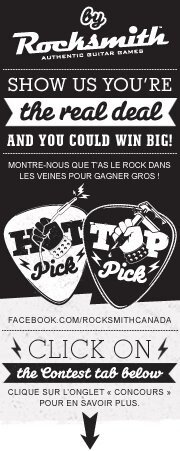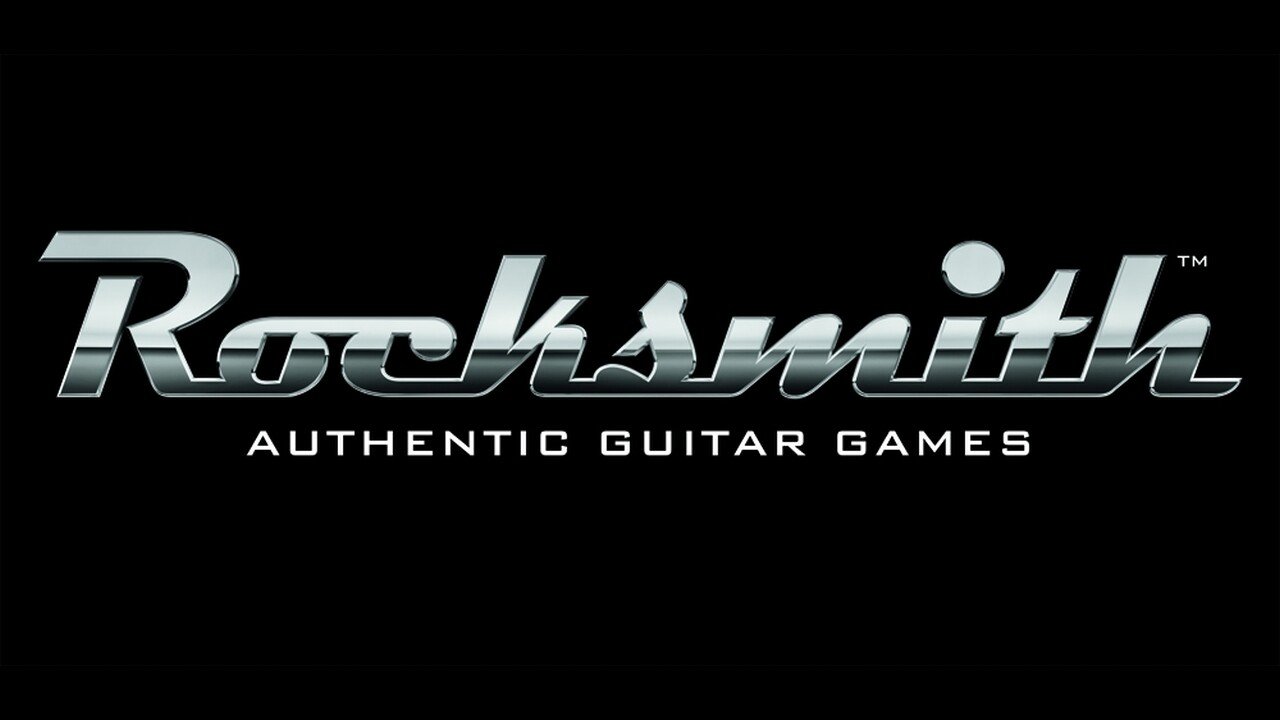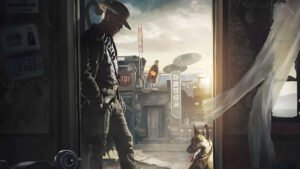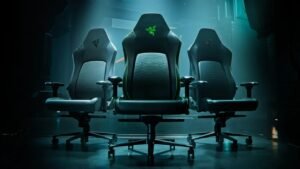Ubisoft has released its entry into the musical game genre with Rocksmith. However, unlike other games, where you simply plug in a controller designed to look like an instrument, Rocksmith uses a real guitar, and helps you learn how to really play. Rather than just learning the timing with some buttons, you actually learn to play the strings. It’s more than just another game; it’s an experience that has to been seen first hand.
Ubisoft has set off a huge contest to help promote their game. With their Hot Pick Top Pick contest, fans get a chance to go backstage and meet Megadeth in person. And even better, they get a chance to play one on one with Chris Broderick himself.
We managed to get in touch with an Ubisoft spokesperson to get more detail on Rocksmith, and the amazing Megadeth promotional contest that they’ve been using to draw all eyes to their latest release.
Adam Taylor: First can you introduce yourself and what you do for Ubisoft?
Adam Partington: Sure, I’m Adam Partington. I’m the director of marketing here for Canada.
T: Can you explain more about this Megadeth contest you have going on, and why it’s important for Rocksmith?
P: So we did this initiative, it’s called the Hot Pick Top Pick contest. In order for us to come across as being more authentic. The idea is that we’re trying to align with people that already have a strong association with guitar related music. People that either are already players either in the past or are at the very beginning of their playing careers; or people who are just interested in rocking out within the context of the popular media type of video games.
That’s why we chose Megadeth, because they’re quintessentially a guitar band. They’re very well renowned for being heavy, heavy guitars. It also helps that they just came out with a DLC related to Rocksmith.
T: I know that there was DLC announced for them, but I don’t know much about it.
P: The DLC was related to three of the songs that were on one of their recent series of albums. They are Symphony of Destruction, Public Enemy No 1 and Hangar 18.
T: All good tunes.
P: All fantastic, heavy rock and roll, very heavy metal tunes.
T: How has response been to this contest as of yet?
P: I think it’s been quite good. We could always do better, right? More and more numbers. But we have about a 1000 participants in the Top Pick portion of the contest. Which was getting people to create their own artistic impressions of a pick design using our online pick generation and manipulation tool. This is their means to be able to actually enter the contest. So essentially it creates the design for them, puts them online and gets people to vote for them. The mechanic to enter is the more votes you get, the better opportunity you have to actually win access to win a pair of tickets to get you backstage access to the artist.
T: And was the concert the one tomorrow?
P: This contest is ongoing; it’s related to every single one of the Megadeth concerts. It reoccurs and reoccurs and reoccurs. And the idea is that it’s supposed to build up.
Now there are kind of three methodologies in this contest. One of these is the Top Pick that’s the one that we described as the pick manipulation tool. We have about a thousand participants right now, but that’s not to say that a lot more people don’t actually know about it, as all of these picks have been shared at least once, if not more than once. So their social network gets access to these picks, the mechanics of the contest entry is such that the more votes you get the more opportunities you get to win within your particular tour date location.
Now there’s another one, which is Hot Pick, it’s related to a portion of the contest where about you enter in to actually play against Chris Broderick at our booth at the show. If you put in one of the three song demonstrations, one of the three songs in the DLC, which is uploaded to the website then the mechanic is such that if people vote on it and you get voted to the top of the list then you get to play against Chris Broderick, the lead guitarist of Megadeth, at the booth.
T: That’s exciting.
P: It’s very cool. Not so much exciting but the chance of a lifetime.
T: Yeah, no kidding. A lot of people would kill to go against their idols in guitar.
P: And on equal terms. Actually playing the game at the booth, which is sort of a mitigator. So it makes a much more level playing field. What’s actually cool about this is that we thought we’d actually figured that we’d end up with one or two people having actually won, during the process of this competition. But we actually ended up with one winner on Friday.
T: Really?
P: We had this dude win the guitar right off of Chris Broderick’s back. That’s the prize. You play, and if you beat him, you win his guitar.
T: And this is at every Megadeth show?
P: Every single Megadeth show in Canada has this mechanic.
T: So there will be one at the show tomorrow?
P: There should be one at the show tomorrow. We have videographers and photographers there. We’ve got at least two participants for Oshawa. One of them has gotten 52 votes, the other has 11 votes. Think about it, that video has been shared 52 times on Facebook and then that share has probably been shared a number of other times.
T: So how has the overall response been to this game compared to other games? Because you are unique for the fact that you actually allow the use of real instruments.
P: I think that’s probably the biggest point of reference for people’s interaction and expression of their interaction of the game. The first thing they say is “Oh, it’s a real guitar?”
It’s the fact that they can associate this game as an authentic experience related to playing an instrument. It comes across as having a really high level value. They are inspired by this learning tool; I wouldn’t even call it a game at this point. It’s really a learning tool.
T: So do you think people could pick up this game and learn to play the guitar with it?
P: Yes. In fact it’s an adaptive learning tool. It will start you off tuning your guitar. Once you’ve tuned your guitar, as it has a tuner built in, it will start you off in a song at a mediocre level, because you haven’t already started your user profile. And then very quickly it will try to figure out if you’re playing the song well or not. If you’re playing it poorly it reduces the level of difficulty with regards to the song where it gets to the point of one finger, one string. And it does this dynamically, so say you’ve been playing the game for a while, and you’re not bad, and then it comes to a solo part and you make a mistake. You’re fumbling and basically dropping the ball on the song. It will reduce its difficulty level quite quickly in order for you to feel like you’re still making progress in the context of the song. You’re not overrun at that level for the entire duration of play.
T: So how has the response to this game been this far? Has it been positive overall?
P: I think people are freaking out over it. The biggest part of the response has been that this is amazing; “I want more songs.”
T: So what are the future plans for Rocksmith then? I’m guessing you can’t talk about many of them, but you might be able to give us something.
P: We plan on putting out more great songs into the marketplace through DLC. For people to be able to associate with some of their favourite bands, both past and present.
T: Can you announce any of the bands that will be included?
P: No.
T: Fair enough. In the development process of Rocksmith, why was the choice made to go with such a learning tool over game for this particular title.
P: I think it’s because some of our competitors had originally put into the market something that was purely game based, and we think that that was basically having the music genre and video games having the door opened. And we decided to walk through it and make it something a lot more authentic. Turning a leisure activity into something that can actually become really attributed to other forms of learning in life.
T: So do you think it’s been a hindrance or an advantage to be so hard-core learning rather than basically a party game.
P: It’s not so much a party game. I’ve had friends of mine after playing this for a while tell me I’ve had a guitar in my life for the last 30 years, it’s been sitting the on the shelf looking good and whatnot, and here’s this game and I get the chance to play with a buddy of mine. Play side by side.
T: A lot of them jam when they wouldn’t normally.
P: Have them over and instead of talking about the kids they now have, they get to jam a bit. They even turn the game off at the end of their hour and a half session, and just playing along with one another, basically using it as an amplifier. The fact that it’s really learning based, it’s not a hindrance at all, and it’s not gimmicky. It’s an enabler. That’s the way I would call it. It allows us to reconnect or to connect with something that is integrally a human experience. Learning how to play an instrument. That unto itself is giving it a lot of value. A lot more value than our competitors are doing, just giving a game based experience.
T: That’s interesting, having played guitar a long time ago, I’m rather interested in giving this tool a try. I’ve still yet to try it.
P: It’s so funny that you actually say that, because what we’ve noticed from some of our market research lately is that this product is actually skewing in some cases quite a bit older than our interpretation upon its launch.
T: What were you anticipating when first launching?
P: We thought that the 18’s, early 20’s was where it would lie. But what we’ve found is that this 35 to 45 portion of the demographic is actually eating this up too.
And it’s not a single digit number. After thinking about it, it makes total sense.
I’m in my mid-thirties and have been playing since I was 12. And up to the age of 22-23, it was a huge part of my life, and then I started working on my career.
T: Career does tend to get in the way of that.
P: Career, children, not so much in the way, but it takes precedence. You have to set your priorities straight. If you can’t make a good living with it, then you have to put it on the side. But you still define yourself as a musician. Because it was such a big part of your adulthood. This instrument is kind of the revolution I had four years ago, where “you keep introducing yourself as an artist and musician, as an organizer of people to the media”, but you don’t really play music, so how much of that is really real. Should you be changing your self-definition?
When it comes to this instrument, I see it as being an enabler for people with a guitar. They’ve got this thing in their basement that’s been collecting dust for the last 15-20 years, they think about it with such high regard, they associate it with their personality as a major part of who they are, but it’s not real as they don’t put it into their day to day experience.
T: So there are two bundles for this game. A guitar bundle and regular bundle, which is just the game itself.
P: That’s correct.
It’s the thing that touches my heart out of all the titles that I’m working on; this is the one that really connects with me on a more profound emotional level.
T: Honestly, when I first heard this game announced, I said to myself “finally a game that actually goes beyond just playing a game and allows you to learn something from it.”
P: Something about the bundle is that it’s a great value. It’s a real guitar, a Gibson Epiphone, for under $200.
T: Where can you buy these bundles?
P: The bundles are few and far between because of their value. You can buy then at Future Shop and EB, and the major distributors. It’s simply a matter of finding them while they’re still



